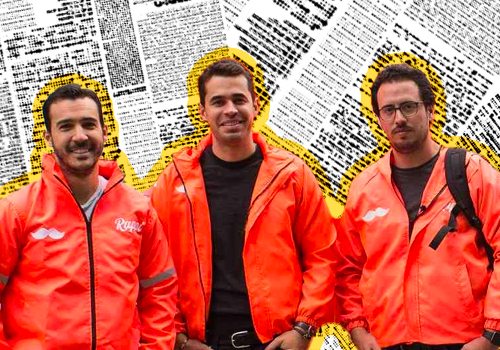Newsletter

Weekly news and teardowns on trending startup companies

The most relevant Twitter threads of the week

Product of the week brought to you by ProductHunt

Detailed stats on the companies that raised venture capital

How many subscriptions do you have? If you're like me (and you like movies, music, and news), you're subscribed to tens of services, probably more than you think. The problem is that if we want to access something new, it's most likely a subscription.
In the past two years, we've lived the peak of the monthly payment. On average, we've gone from two subscriptions before the pandemic to more than five, and companies have noticed this. Now everything is a subscription, and I don't like it. In fact, I'm leaning more towards the "hate it" side, and I'm not the only one.
Everyone knows that Netflix hasn't had a good 2022 (losing more than 200,000 subscribers in Q1 alone) and that's baffling considering that it used to be the go-to place for entertainment. Thousands of series and movies were in one place, and Netflix produced plenty of original content on top of that. Of all the streaming platforms it had the most subscribers and could allow itself to create"varied" content. Basically, it threw everything at a wall to see what would stick.
Meanwhile, Prime, HBO Max, and the rest of the streaming services, focused on niche content, and that strategy seemed to work. People preferred the other platforms, and instead of paying for both, they chose one. So, Netflix lost its grip on society and it's struggling to keep their loyal subscribers subscribed.
This situation echoes a bigger problem. We're going through a tidal wave of unsubscriptions. The rising cost of living means that budgeting becomes stricter, and yes, that means sacrificing one, two, or even three subscriptions and this applied to more than just streaming services. Research shows that the most cancelled subscriptions in the US are TIME, The New York Times, Audible and BeenVerified.
Plus, we're no longer in lockdown (at least for now) so, many of us will prefer to go to the supermarket, get some fresh air, and see people instead of getting our meals delivered to us in boxes. A fascinating example is how Costco memberships have increased lately even with the rising inflation. They grew because they add an essential value to life.
On the other hand, not everything deserves a subscription, though we are made to believe that it does. We only need some services once, or we can get them for free somewhere else, like news, for example. Just look at CNN+. Was there really a need for an additional monthly subscription for commentary that you can already get on Twitter for free?
Companies are desperate to have us pay for subscriptions, and not all of them will pan out. The subscription addiction that we're going through right now is unsustainable. Unfortunately, I don't see a replacement coming soon. For the moment, it's all about managing those monthly payments until they become disposable. So, if you cancel one, I wouldn't blame you.

In Latin America, delivery services have become a staple in everyday lives. Competition is tough, as many companies battle to bring you everything you need, but one was determined to stand out. Rappi started with deliveries, and now it even has its own digital wallet and credit card.
Rappi's drive to become a unicorn spilled over to its employees. The startup's core beliefs sparked even more creativity, and employees wanted to venture into their own ideas. So, many have left the company, and this isn't a bad thing, according to Juan Pablo Ortega, one of its founders.
There's so much talent coming out of Rappi that it has drawn comparisons to PayPal and how it helped shape Silicon Valley. After all, former Rappi employees have created more than 100 startups in the Latin American region and even one in Africa. At this pace, it's only a matter of time before Rappi influences startups globally.

Minuteskill's three co-founders came up with an idea for a startup. Once they laid out their plan, they faced one big hurdle but, after finding Slidebean's videos, the startup from Toronto managed to raise $250,000. Plus, the lessons don't end there.
Threads of the Week

A company can have millions of dollars in annual revenue and it’s ‘just’ be growing at 3%, but if you put that stat in front of an investor they will call it mediocre, non-fundable. But unfortunately this is the reality for thousands and thousands of bootstrapped, profitable startups/companies with solid revenue basis, sticky products, and good economics, but they just aren’t fundable.
Because venture capital is reserved for a privileged few. For extremely-fast growing businesses- effectively the top 10% of companies are growing the fastest.

The past five years have been great for African startups. Investment boomed, and, up until recently, the entire continent seemed unstoppable. With a vast population and a need for solutions, African nations hold endless potential, and investors saw this. In Q1 2022, startups in the continent raised $1.8 billion in funding, outpacing the $1.3 billion raised in all of 2019. So, there seemed to be no concern, but the global economy had other ideas.
The recession hit Africa hard, and investors are more cautious with their funds. Plus, this crisis forced them to rethink the approach to funding in the continent. So now, it's about analyzing the other challenges in the region.
The continent's endless potential comes at a cost. Africa battles obsolete infrastructure and heavy regulation. Plus, bureaucracy can outwill any founder so it's no longer about a game-changing idea. Instead, investors care more about the startup's ability to navigate everyday challenges.